Winn Adami was an ambitious Bajoran religious leader and the first kai of Bajor elected after the Cardassian Occupation. A member of a frequently outspoken orthodox order, Winn was steadfastly rooted in her faith even as she proved a shamelessly arrogant and treacherous opportunist. In that regard, she often came into conflict with the Emissary of the Prophets, Benjamin Sisko, whom she considered an outsider unworthy of receiving the wisdom of the Prophets. After years of living in Sisko's shadow, however, and a lifetime of never receiving any guidance and affirmation from the Prophets whom she had served and sworn allegiance to all her life, she eventually turned against them. Ultimately, however, she realized her error and died trying to undo it.
Religious career[]
Cardassian Occupation[]
During the Occupation, Winn was imprisoned for five years for teaching the faith of the Prophets. She received numerous beatings at the hands of the Cardassians for her beliefs. Winn resented the belief held by some members of the Bajoran Resistance that they alone had saved Bajor, since she had faced as much danger and suffering as they, but she did not have weapons to protect her. (DS9: "Rapture")
As a ranjen, Winn once convinced the head of her order to take a more active role in helping the Bajoran people. He allowed her to remove gemstones from their tabernacle, with which she used to bribe Cardassian officers for small acts of kindness. One of these officers was Prenar, whom she paid to divert a transport filled with Bajorans due to be executed. (DS9: "'Til Death Do Us Part")
Vedek Winn[]
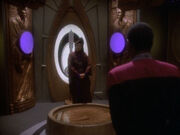
Winn meeting with Benjamin Sisko in a Bajoran temple
By the time Bajor regained its independence in 2369, Winn was one of the more influential vedeks in the Vedek Assembly. She had some support to succeed Kai Opaka after the latter disappeared in the Gamma Quadrant, although Winn's rival and fellow vedek Bareil Antos was favored for the position. Winn believed the Federation presence on Bajor posed a dire threat to the Bajorans – that the people of the Federation were "without a soul" and existed in a "universe of darkness." She also disagreed with Kai Opaka on the declaration of Benjamin Sisko, a "non-believer," as the Emissary.
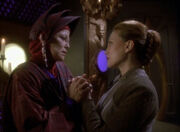
Winn with Neela
Winn traveled to space station Deep Space 9 seven months after Starfleet assumed control of the station, apparently to protest the "blasphemous" teaching of scientific principles in a school newly opened by Keiko O'Brien. Winn called for a Bajoran boycott of the school until Keiko changed her curriculum. This led to an increase in anti-Federation sentiment throughout the station, culminating in the bombing of the schoolroom. It was suspected that Winn's true plan was to lure Vedek Bareil to Deep Space 9 to calm the crisis, so that Neela could assassinate him. The assassination failed, but despite Major Kira Nerys' suspicions, no link between Neela and Winn could ever be established. (DS9: "In the Hands of the Prophets")
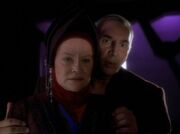
Winn and Jaro conspiring
Shortly thereafter, Winn secretly lent her support to Minister Jaro Essa and the Alliance for Global Unity (or "the Circle") in their attempt to topple the Bajoran Provisional Government and force the Federation from Bajor. Winn agreed to bless Jaro's ascendance to power, in return for his assurance that she would be made the next kai. However, she turned on Jaro when evidence emerged that the Circle was being indirectly supplied by the Cardassians. (DS9: "The Circle", "The Siege")
With the election for kai approaching in late 2370, Winn was in danger of losing the election to Bareil. She learned of circumstantial evidence from Kubus Oak, a collaborator with the Cardassians, that Bareil, not Prylar Bek, was the traitor responsible for the Kendra Valley Massacre. Winn granted Kubus sanctuary on Bajor, so that she could use his testimony against Bareil. After Major Kira Nerys stopped her ship to prevent Kubus from leaving, Winn requested that Kira investigate the circumstances of the massacre. Convinced of Bareil's innocence, Kira readily agreed.
Kira discovered that it was Kai Opaka who gave the Cardassians information leading to the massacre, as she sacrificed the lives of forty-three Resistance fighters to save more than a thousand civilian lives in the Kendra Valley. Bareil was committed to protecting Opaka's name despite his own innocence, and withdrew his candidacy, merely days before the election. With her ascension to kai assured, Winn saw no more need to pursue the issue or even learn what Kira had found. (DS9: "The Collaborator")
Kai Winn[]
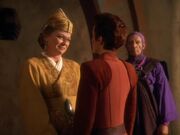
Winn speaking to Kira Nerys, very soon after becoming kai
Winn was appointed to kai on Bajor, in late 2370. Some of her first acts as kai were advising Kira, "In time, you will learn I am not your enemy," and indirectly postponing an appearance with Commander Sisko in front of the Vedek Assembly. Bareil accepted Winn's victory as "the will of the Prophets" and privately predicted to Kira, "[Winn will lead us] down paths she cannot possibly imagine. She's going to need our help along the way, even if she doesn't realize it yet." At Kira's choosing, she herself and Bareil were among those who paid initial respects to the newly-elected kai. (DS9: "The Collaborator")
Although the writing staff of Star Trek: Deep Space Nine had spent almost the entirety of the show's second season planning to make Bareil the new kai, electing Winn to that position was a last-minute decision. "We were all sitting in the room," recalled Robert Hewitt Wolfe, "and it occurred to us, 'God, we could […] make Winn the kai. That's a scary idea!'" Promoting her to kai obviously allowed for more much-desired conflict for the future of the series than with Bareil in the role, which was why the writers chose to opt for Winn being elected. (Star Trek: Deep Space Nine Companion, p. 147)
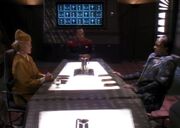
Winn negotiates the Bajoran-Cardassian Treaty with Legate Turrel in 2371
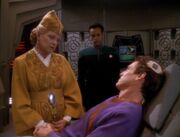
Winn with Bareil and Dr. Bashir
Following the election, Kai Winn accepted Bareil's assistance as her most trusted advisor. At Bareil's suggestion, Winn initiated secret negotiations with Legate Turrel of the Cardassian Central Command, to finally establish a peace treaty between their respective peoples. Winn admitted privately that it was Bareil's counsel that allowed the negotiations to advance as far as a scheduled face-to-face meeting with Turrel in 2371. Unfortunately, an accident aboard their transport severely injured Bareil, threatening to derail the talks. Winn supported Bareil's decision to keep himself conscious in order to guide her through the talks, since she knew her diplomatic skills were insufficient to complete the negotiations alone. Winn successfully signed the treaty with Turrel aboard Deep Space 9, but Bareil died of his injuries soon after. (DS9: "Life Support") Winn used his death to publicly claim that she herself had been the primary party responsible for the treaty, 'defending' her proclamations to those aware of the truth by arguing that Bareil was a humble man who would not have sought to take credit for the treaty if he had lived.
The portrayal of Kai Winn in "Life Support" was influenced by the fact Winn actress Louise Fletcher was very ill while appearing in those scenes. "I had laryngitis and had to loop that show," the actress noted with a laugh, referring to the post-production process of using voiceover recording to substitute pieces of dialogue already filmed. (Star Trek Monthly issue 34, p. 50) "In some of the dailes," recalled Ira Steven Behr, "we would look at her and say, 'Jesus, she has no business being up. She should be in bed.' But she was a real trouper." (Star Trek: Deep Space Nine Companion, p. 205) Behr elaborated, "On screen she just doesn't have that same nasty little streak that we normally get out of her." (Captains' Logs Supplemental - The Unauthorized Guide to the New Trek Voyages, p. 90) Nonetheless, Fletcher's performance in the episode was appreciated by all who worked on the production, possibly even more so due to her illness. (Star Trek: Deep Space Nine Companion, p. 205) Despite enduring the ailment during the episode's production, Fletcher herself considered "Life Support" her favorite installment of all the episodes she worked on in DS9's first five seasons. She also said it contained her favorite line from all of those installments, which is when Winn, requesting that Dr. Bashir give Bareil a brain transplant just so he can continue helping Winn with her diplomatic negotiations with Cardassia, says to Bashir, "You were able to replace some of his internal organs with artificial implants. Could you do something similar with the damaged parts of his brain?" Fletcher thought the line was extremely funny. (Star Trek Monthly issue 34, p. 50) "I had a hard time getting that out without cracking up," she conceded. (Cinefantastique, Vol. 32, Nos. 4/5, p. 69)
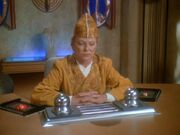
First Minister Winn Adami in 2371
Later that year, Kai Winn was appointed first minister pro tempore after the death of previous First Minister Kalem Apren. With the elections a month away and no other candidates to oppose her, it seemed as though Winn would become both Bajor's spiritual and political leader. However, Winn hoped to gain public favor by initiating a project to grow cash crops in Rakantha Province. To do so, she ordered a group of farmers in Dahkur Province to immediately return soil reclamators which had been leased to them by the government two months before. Most of the farmers were former members of the Shakaar resistance cell, and were led by their former leader, Shakaar Edon.
Shakaar refused to return the reclamators, stating that he and his comrades had been promised access to the equipment for a full year and that the devices were needed to de-toxify the soil in Dahkur. Winn assigned Major Kira, who had once served under Shakaar, to bring back the equipment. Although Kira recommended that Winn meet with Shakaar to negotiate, Winn instead sent Bajoran Militia units to arrest Shakaar and bring back the reclamators by force. Kira helped Shakaar to escape and rally his former Resistance members in the Dahkur Hills. Undeterred, Winn ordered more civic police into the province to apprehend them.
For two weeks, Shakaar and his group eluded the civic police in the mountains, all the while gaining popular support. Winn was forced to declare martial law and suspend local government in the Hill Provinces to keep order. Despite the risk of civil war, Winn was convinced anarchy would follow if Shakaar was allowed to defy the law, and that the Prophets were testing her with the crisis. Finally, Shakaar's group confronted their pursuers in Tanis Canyon and reached an agreement. Shakaar entered himself as a candidate for First Minister, and the Militia agreed to stand down until after the election. Realizing Shakaar's popularity, Winn decided to cut her losses and issue a statement of support for Shakaar. (DS9: "Shakaar")
Originally, Winn wasn't part of the story that became "Shakaar", the production of which was delayed. When the writers were struggling to resurrect the plot towards the end of DS9 Season 3, they struck upon the thought that they could include Winn, the idea of her ascendance to First Minister, and the notion of her seeking Kira's help. "It wasn't until we'd seen Kai Winn doing the peace treaty with Cardassia that it became obvious she was rising to more political authority on Bajor," remembered Ronald D. Moore. (Captains' Logs Supplemental - The Unauthorized Guide to the New Trek Voyages, pp. 97 & 98) He also stated, "We thought, 'What if she goes all the way and becomes leader of the planet? That will really set the stakes and bring Kira into the story.'" Hence, the addition of Winn into the narrative for "Shakaar" ended up saving the plot. (Star Trek: Deep Space Nine Companion, p. 244) Ira Behr referred to Winn's appearance in the resultant final version of "Shakaar" as "one of Louise Fletcher's best performances." (Captains' Logs Supplemental - The Unauthorized Guide to the New Trek Voyages, p. 98) Fletcher herself appreciated the insight into her character which is presented in the episode, commenting, "You get to see a lot of her power and the selfish motives for which she uses it." (Star Trek Monthly issue 34, p. 49)
During DS9 Season 4, Kira actress Nana Visitor was impressed by how the character of Winn was influencing other aspects of the series. She noted, "Kai Winn is making things very interesting […] To have as the head of your religion someone who's so corrupt is problematic." (The Official Star Trek: Deep Space Nine Magazine issue 16, p. 45)
In 2372, Kai Winn supported the appointment of Akorem Laan as the new Emissary, since he shared many of her conservative religious and social views. (DS9: "Accession") The following year, she returned to Deep Space 9 for a ceremony that was to signify Bajor's admittance to the Federation, shortly before Sisko discovered the lost city of B'hala. Sisko's accomplishment finally convinced Winn that he was the true Emissary, and she attempted to reconcile with him. During her visit, she helped Sisko advance his pagh'tem'far visions with the Orb of Prophecy and Change. Winn disagreed with Jake Sisko's decision to stop the visions when they threatened his father's life. (DS9: "Rapture")
The DS9 writing staff deliberately transformed the character of Winn Adami through the course of DS9 Season 5 installment "Rapture". "The intention was to make her a bit less of a villain, and force her, because of the magnitude of what Sisko was doing, to reassess her feelings about him […] But as the show progressed, we eventually needed to get her back to another area, back to the older Kai Winn," explained René Echevarria, regarding Winn's character arc in "Rapture". "So a moment of redemption was in her grasp, but her venality wins out in the end. And she loses." Having Winn give a speech to Kira about how she spent the Occupation was an attempt, by DS9's in-house writers, to turn expectations on their heads. (Star Trek: Deep Space Nine Companion, p. 406)
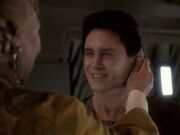
Winn feels Weyoun's pagh
As war loomed in late 2373, Kai Winn was approached by Weyoun with a nonaggression pact between the Dominion and Bajor. Winn was faced with a difficult decision. If she rejected the treaty, Bajor could be the first casualty of the coming war, and if she accepted the treaty, it could constitute the first step to Bajor's assimilation into the Dominion. Heeding advice from Sisko to "stall," Winn eventually passed the treaty to the Chamber of Ministers without a recommendation. (DS9: "In the Cards")
In the penultimate fifth season episode "In the Cards", Winn Adami is featured in one scene with Weyoun and they, at least in the opinion of Weyoun actor Jeffrey Combs, act "very Machiavellian" toward each other while meeting. Louise Fletcher's portrayal of Winn impressed Combs, who later remarked, "She really captured the tone of diplomats dancing around each other." (Cinefantastique, Vol. 29, Nos. 6/7, p. 60)
Louise Fletcher herself approved of a condescending dismissal Winn gives Kira in "In the Cards". Remembering this line, Fletcher commented, "I loved saying, 'You may go now, my child.'" (Cinefantastique, Vol. 32, Nos. 4/5, p. 68)
On the day before the sixth season opener "A Time to Stand" entered production, Ronald D. Moore had little knowledge of how Winn would next be depicted. At that point, he told fans, "I'm not sure what the next step will be for the Kai (don't worry, we won't forget about her)." (AOL chat, 1997)
Kai Winn again visited Deep Space 9, in 2374, to discuss Sisko's removal of an ancient stone tablet from the excavation at B'hala. She and First Minister Shakaar together submitted a formal request for its return to Bajor; it was the first time they had agreed on anything. However, Sisko shattered the tablet under the influence of the Prophets, unleashing a Pah-wraith (or "Kosst Amojan") and a Prophet which took possession of Jake Sisko and Kira Nerys respectively, and the Reckoning then began aboard the station. Winn stayed aboard to lead prayers in support of the Prophets, but she eventually interrupted their battle with Kosst Amojan by flooding the station with chroniton radiation, because she could not tolerate the fact that Sisko's faith was stronger than hers – that he was willing to sacrifice himself and his son, Jake, to follow the Prophets' path. (DS9: "The Reckoning")
Winn Adami, rather than Jake Sisko, was originally possessed by the Pah-wraith, while "The Reckoning" was being written. Since Jake was selected to be inhabited instead, the writers had an opportunity to return Winn to a direction she had veered from in "Rapture". Though she seems to be slightly coming round to supporting Sisko in that installment, she clearly opposes him in "The Reckoning". "That was the biggest dodge we did," reflected René Echevarria, "because we didn't really explain why she had a change of heart, but it set up what we needed to do with her later in the season." Ira Behr believed that, in "The Reckoning", "a more multidimensional Kai Winn" appears. He admitted, "We had lost sight of what to do with her for a while. We loved having her as a villain, but this really made her a tragic figure. It made her a totally screwed-up figure, and we now understood her." Kira actress Nana Visitor criticized the portrayal of Winn in "The Reckoning", however, as she felt the writers didn't make her feel her tragedy enough and that Kira was too lenient with her. (Star Trek: Deep Space Nine Companion, pp. 566-568)
Betraying the Prophets[]
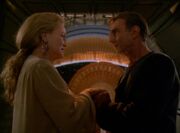
Winn with "Anjohl Tennan", shortly after they first met
In late 2375, Kai Winn traveled to Deep Space 9 to honor an upcoming wedding between Sisko and Kasidy Yates. There, she had a series of visions which she believed to be from the Prophets, which told her the Emissary had erred and that she was to return him to the proper path. They advised her to expect a "guide," who emerged to be the farmer Anjohl Tennan, actually Gul Dukat in Bajoran disguise. As Tennan, Dukat insinuated himself as Winn's closest advisor and confidante, and the two also became romantically involved. (DS9: "'Til Death Do Us Part")
The DS9 producers were pleased with how Winn's connection with Dukat was portrayed on camera. "The deception of her, before she knows who he is, is a lot of fun," observed René Echevarria. (Cinefantastique, Vol. 32, Nos. 4/5, p. 70)
The decision to romantically pair Winn with Dukat was arrived at without much forethought. "Ira had said, 'It's too bad we can't get Winn and Dukat in bed together,'" Ronald D. Moore relayed. "And I said, 'Well, why can't we do that?' And everyone just stopped and said, 'Wait, that's a great idea.'" (Star Trek: Deep Space Nine Companion, p. 687)
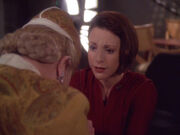
Kira trying to get Winn to step down as kai
Winn was horrified to learn her visions had actually been sent by the Pah-wraiths, and more so when Anjohl revealed he was in service of them as well. Winn sent for the Orb of Prophecy to ask the Prophets' forgiveness. However, when she stood before the orb, nothing happened: she had no vision and was not spoken to by the Prophets. Believing the Prophets had forsaken her for consorting with the Evil Ones and by having strayed from the path for so long, Winn sought Kira's counsel on how to again prove herself worthy to them. She knew she had, more often than not, put her own political interests ahead of the spiritual well-being of the Bajoran people and wanted to repent. She claimed she was willing to do anything to earn their forgiveness and Kira assured her it was not too late, that she could still go back to the good graces of the Prophets by setting aside the things that led her astray, such as ambition and jealousy. Though Kira suggested that Winn step down as kai because it was power that had led her astray, Winn balked at this answer, insisting the Bajoran people needed her. Kira left, knowing she had failed to get through to Winn. (DS9: "Strange Bedfellows")
The scene in which Winn refuses Kira's advice to surrender political power was thought up late in the writing of "Strange Bedfellows" and was difficult for Ronald D. Moore to write, as it was tough to capture the tone of the scene in a way he and the other DS9 staff writers were happy with. Although Kira could be viewed as extremely dismissive and cruel on the one hand, Kai Winn's stubbornness also had to be taken into account. "You have to understand that Winn is a total loss," commented Ira Steven Behr, "that she just doesn't get it […] You think maybe she's going to get it, but she just can't. She's blind." (Star Trek: Deep Space Nine Companion, p. 689) Louise Fletcher described the scene as "one really good one" between Winn and Kira, also noting, "Character wins out [ultimately]." (Cinefantastique, Vol. 32, Nos. 4/5, p. 68)
Winn eventually confessed to Dukat that the first time she saw the gate to the celestial temple, people all around her were in awe, feeling the love of the Prophets, while she felt nothing and simply forced a smile, because that was expected of her. Disappointed, she remarked that, in fact, the Prophets had never spoken to her, that they had never offered her any guidance nor trusted her with anything, and that she was now expected to step down as kai in order to be blessed by them; that was the last straw for Winn, who – after this epiphany – resolved that she would no longer serve gods who gave her nothing in return for her faith and sacrifices, and who favored an alien Emissary over her. She was willing to walk the path the Pah-wraiths had laid out for her. (DS9: "Strange Bedfellows")
Louise Fletcher was surprised by how quickly Winn's allegiances changed from the Prophets to the Pah-wraiths. "That really stunned me," she expressed. "That just showed how empty she was." (Cinefantastique, Vol. 32, Nos. 4/5, p. 68)
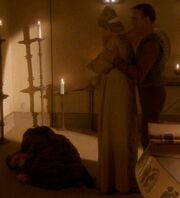
In shock, Winn stands over Solbor's dead body, while being held by Dukat
Anjohl told Winn their mission was to free the Pah-wraiths from the Fire Caves, thus bringing about the Restoration of Bajor. With her authority as kai, Winn was the only person on Bajor who had access to the Book of the Kosst Amojan. Winn intentionally stabbed her long-time attendant, Solbor, after he discovered Dukat's true identity and that she and Dukat were working together. When Solbor's blood dripped onto the blank pages of the Book, its secrets were revealed to her. Despite her hatred of Dukat, Winn continued their alliance. However, she tried to teach him a lesson of humility, sending him away to beg on the streets of Bajor. (DS9: "The Changing Face of Evil", "When It Rains...")
The DS9 writing staff were pleased to continue Winn's relationship with Dukat in "The Changing Face of Evil". "It was a great thing to keep the Kai Winn and Dukat plot [going]," noted Hans Beimler, who co-wrote the installment with Ira Steven Behr. (Cinefantastique, Vol. 32, Nos. 4/5, p. 71) As for the way Winn's relationship with Dukat is depicted in "The Changing Face of Evil", René Echevarria pointed out, "Winn is completely on board with Dukat." (Star Trek: Deep Space Nine Companion, p. 689) Alternately, he commented, "Once she finds out who he is and what he is up to, and then decides to stay with him, they become these two scorpions in a box. The power balance is always shifting between them." (Cinefantastique, Vol. 32, Nos. 4/5, pp. 70-71) Behr observed, "She experiences self-loathing, and loss, and you wonder, 'Okay, does she get it now?' No, she doesn't. As soon as Dukat explains to her that she can cover the murder [of Solbor] up, it's clear that she's the only thing she's worried about. It's always her […] When the smoke clears," continued Behr, smiling, "she's still less tainted than Dukat." (Star Trek: Deep Space Nine Companion, p. 690)
The reason why, in "When It Rains…", Winn sends Dukat out begging and takes some alone time to study the Book of the Kosst Amojan is that the writers had run out of story for her and had nowhere to take the character until series finale "What You Leave Behind". (Star Trek: Deep Space Nine Companion, pp. 687 & 690)
Unleashing the Pah-wraiths[]
Winn eventually learned how to release the Pah-wraiths. Since the ritual required a blood sacrifice, she waited for the return of Dukat. Some days after she had put him out on the street, Winn entered the Fire Caves with him. There, she summoned the fiery Pah-wraiths. (DS9: "What You Leave Behind")
Louise Fletcher found it difficult to perform Winn's last few scenes. One reason was that much of that footage was shot using bluescreen, with the Pah-wraiths inserted into the scenes afterwards, so Fletcher had to imagine what they were like. She did some last-minute audio dubbing of her lines in London, because she was in Europe at a time when the episode needed completing, and Fletcher came to the opinion then that the scenes looked extremely believable. (Cinefantastique, Vol. 32, Nos. 4/5, p. 68)
A short time later, Winn joyfully hurled her ceremonial robe into the flames, unclasped her hair, and gave Dukat a celebratory kiss. She thereafter poisoned him, though, and offered him to the Pah-wraiths. (DS9: "What You Leave Behind")
Regarding Winn's murderous attitude toward Dukat, Louise Fletcher noted, "I said, 'Kiss the Kai and die.'" (Cinefantastique, Vol. 32, Nos. 4/5, p. 68)
Winn was violently declined by the Pah-wraiths; she was thrown against a rock wall by them. (DS9: "What You Leave Behind")
Thrusting Winn against a cave wall was done as a stunt achieved by Patricia Tallman. "I don't know how I survive that," Louise Fletcher noted. "The stunt woman really did a great job." (Cinefantastique, Vol. 32, Nos. 4/5, p. 68)
Winn was shocked and severely disappointed to see that the Pah-wraiths favored Dukat as their new Emissary, taking possession of his body. After Sisko arrived and the restored Dukat attacked him, Winn, realizing what she had done, tried to destroy the Book but Dukat took it back by making the book suddenly disappear from out of Winn's hands. (DS9: "What You Leave Behind")
Creating the effect of Winn losing grip of the Book of the Kosst Amojan was done as a practical effect rather than a visual effect, on Dan Curry's recommendation, and involved some useful acting from Louise Fletcher. "We asked Louise to lift the book over her head as the camera moves up to her face," Director Allan Kroeker recalled. "Suddenly she reacts and brings her hands down empty. I thought it was ingenious." The shot, which took about ten takes to perfect, was completed by the DS9 grip with the longest arms simply grabbing the book out of Fletcher's hands. (Star Trek: Deep Space Nine Companion, p. 710)
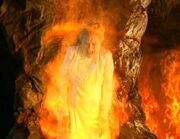
In her final moments, Winn Adami is engulfed in flames
In response, Winn urgently implored to Captain Sisko, whom she finally acknowledged as the true Emissary of the Prophets, an instruction to destroy the book. She was killed by Dukat, who engulfed her in flames. Her death, however, was enough to distract the egocentric Dukat long enough for Sisko to throw himself, Dukat and the Book into the fire. The Book was destroyed, leaving Dukat trapped forever with the Pah-wraiths in the Fire Caves, while Sisko joined the Prophets in the Celestial Temple; thus Winn in her one and only heroic act saved Bajor, the Temple and the Alpha Quadrant. (DS9: "What You Leave Behind")
Louise Fletcher was eager to learn precisely what Winn's fate would be. "I kept waiting and wondering how they were going to deal with her demise," she related. "I don't think they really knew. I don't think they knew until zero hour how they were actually going to do it." Once she found out how Winn was to die, Fletcher believed it was a fitting end to the character. She laughed, "I thought she got her just desserts." (Cinefantastique, Vol. 32, Nos. 4/5, p. 68) It likewise made sense to Ira Behr for Winn to be killed specifically by Dukat. This was because the pair had had sex and, according to a horror movie cliché, characters who have sex end up dead afterwards. (Star Trek: Deep Space Nine Companion, p. 709)
Filming Winn's death scene was quite straightforward. Remembered Allan Kroeker, "We told Louise Fletcher that the Pah-wraiths were going to come out of the canyon and wrap around her like a serpent. Then she reacted in such a way that would help sell the effect." (Star Trek: Deep Space Nine Companion, p. 710) Fletcher herself, however, said, "It's hard acting with nothing, imagining what flames feel like." (Cinefantastique, Vol. 32, Nos. 4/5, p. 68)
Memorable quotes[]
"Those of you who were in the Resistance, you're all the same. You think you're the only ones who fought the Cardassians, that you saved Bajor single-handedly. Perhaps you forget, Major, the Cardassians arrested any Bajoran found to be teaching the word of the Prophets. I was in a Cardassian prison camp for five years, and I can remember each and every beating I suffered. And while you had your weapons to protect you, all I had was my faith… and my courage. Walk with the Prophets, child… I know I will."
"I rid myself of the Prophets and shed a lifetime of hypocrisy."
- - Winn to Dukat (DS9: "What You Leave Behind")
"Emissary, the book!"
- - Winn to Sisko (DS9: "What You Leave Behind")
Appendices[]
Appearances[]
- DS9:
- "In the Hands of the Prophets" (Season 1)
- "The Circle" (Season 2)
- "The Siege"
- "The Collaborator"
- "Life Support" (Season 3)
- "Shakaar"
- "Rapture" (Season 5)
- "In the Cards"
- "The Reckoning" (Season 6)
- "'Til Death Do Us Part" (Season 7)
- "Strange Bedfellows"
- "The Changing Face of Evil"
- "When It Rains..."
- "What You Leave Behind"
Background information[]
Winn was played by actress Louise Fletcher.
According to the script for "The Collaborator", the pronunciation of Winn was "WIN". [1]
Before Louise Fletcher was cast as Winn, DS9 Producer Robert Hewitt Wolfe had a very different notion of who would be playing the part. "My archetype was Sandy Duncan," Wolfe related. "I wanted someone you just love and when you look at them, you think what a nice, trustworthy person they are and underneath, they're a rotten, scheming, selfish person." (Star Trek: Communicator issue 112, p. 67)
Originally, the producers of Star Trek: Deep Space Nine invited Louise Fletcher to portray Winn. "They just asked me to play this outrageous part, and I thought it was this one-time thing," Fletcher recalled. (Captains' Logs Supplemental - The Unauthorized Guide to the New Trek Voyages, p. 61) She elaborated, "The producers more or less just parachuted me in. They gave me a thumb nail sketch [or, in other words, a rough description] of Winn." (Star Trek Monthly issue 34, p. 49) Fletcher immediately accepted the role. "I figured if Whoopi Goldberg could do it, why not?" she reasoned. "It might be fun […] And I loved the idea of playing a ruthless and ambitious religious leader." (Cinefantastique, Vol. 27, No. 4/5, p. 99) Although the actress wasn't very familiar with the show or her part in it when she first took it, she was soon clued into these aspects. "By the first episode," Fletcher recalled, "I was pretty clear what kind of character she was going to be […] [Quark actor] Armin Shimerman, who is a friend of mine, filled me in on the history of the programme […] as well as who's in the show." (Star Trek Monthly issue 34, p. 49) Fletcher apparently based her portrayal of Winn on someone she had personally known. David Weddle recalled Fletcher alluding to this when he met her (during production on "The Reckoning"); "She talked about drawing upon that character from somebody she knew in childhood. She had her own Kai Winn, according to what she was saying." (Cinefantastique, Vol. 30, No. 9/10, p. 59) As it turned out, Fletcher enjoyed making her first appearances as Winn, in DS9 Season 1 finale "In the Hands of the Prophets" followed by a second-season-opening three-parter. "It was great," she noted. (Cinefantastique, Vol. 27, No. 4/5, p. 101)
Fletcher commented: "Winn uses ambition in the name of religion. Keiko in her class, takes the scientific approach to the existence of the wormhole. Winn is on the far right, for creationism, and she wants it taught that way." [2]
After first establishing the role of Winn, the DS9 staff writers kept requesting for Louise Fletcher to return to DS9. "They kept coming back and asking me to do more. As it turned out, I was available most of the time," she recalled. (Captains' Logs Supplemental - The Unauthorized Guide to the New Trek Voyages, p. 61) Fletcher also said, "I think every now and then they like to do a storyline about this religious leader who comes into their affairs and messes everything up, causing a lot of problems." (Cinefantastique, Vol. 27, No. 4/5, pp. 100-101) The writers didn't, though, reveal inside details exclusively to Fletcher. "I would love to see what Winn's daily schedule is like and what her life is like," the actress gushed. "I never know. The [producers] never tell me, so I'm in the dark. They just call me, send me the script and I'm like a very obedient child." (Star Trek Monthly issue 34, p. 50)
Having make-up, hairstyling, and costuming applied to her so she could play Winn was easy for Louise Fletcher, who stated, "I have an elaborate hairdo and I'm in there [at Paramount studios] quite a while." (Cinefantastique, Vol. 27, No. 4/5, p. 101) The character's appearance was so elaborate that Fletcher laughed, "The costume, the hair, the whole bit was big, big, bigger than life." [3] As a result of the extensive preparations, Fletcher sought some way to reduce her durations in the DS9 make-up chair. (Cinefantastique, Vol. 27, No. 4/5, p. 101) She explained, "When I was just a Vedek I didn't have to worry about my hair, only my make-up… I just had it under a hood." Because the hat Winn wore as a kai exposed some of her hair, Fletcher's visits to the makeup chair took longer as a kai than it did as a vedek, with the kai's makeup and hair taking approximately two hours to be applied to her, each time. (Star Trek Monthly issue 34, p. 50) Fletcher stated, "The costumes were wonderful. All her boudoir stuff was fun, with the hair down." (Cinefantastique, Vol. 32, Nos. 4/5, p. 69)
Louise Fletcher found remembering the words spoken by Winn was "not easy." She explained, "It's a lot of language and it's almost classical. I don't want to say Shakespearean, but [Winn] does have the tragic flaw of ambition and pride." (Captains' Logs Supplemental - The Unauthorized Guide to the New Trek Voyages, p. 61)
Louise Fletcher thoroughly enjoyed the way playing Winn gave her a chance to over-act. (Cinefantastique, Vol. 27, No. 4/5, p. 100) "It's fun to play that high drama," she noted. (Captains' Logs Supplemental - The Unauthorized Guide to the New Trek Voyages, p. 61) The actress elaborated, "The thing I love about doing this part is it's just sort of permissible over-acting. But that's over-acting not in a negative way, it's just sort of operatic, and everybody can be big, because it's a big environment, and the emotions are big. It's just like that black and white thing, the good and the evil and the power. It's sort of like the seven deadly sins. How do you act those in a small way?" (Hidden File 04, DS9 Season 7 DVD special features)
The DS9 writing staff enjoyed teasing audience expectations concerning Winn Adami. "We like to allow the audience to hate […] Winn, and then give her a speech that is basically just for Kira and the audience [that contradicts their expectations]," stated Ira Behr. "It's a perverse thing to do." By changing the character in such a way, the writers tried to increase the realism of the part. "The kai is a really important character on the show and she's not one-note," said Hans Beimler. "She's complicated, multifaceted. That's because one of the things that Ira always has emphasized with us is to make the characters three-dimensional." (Star Trek: Deep Space Nine Companion, p. 406)
In her performances as Winn, Louise Fletcher approached the role from the viewpoint that Winn was truly evil. "Winn's definitely not a sympathetic character," the actress opined. "She's the kind of person you love to hate. That's what I'm striving to achieve." In addition, Fletcher identified Winn as a pathological liar, perverting the will of the Prophets and twisting their words to suit her own goals. "Winn is always defining her role as the spiritual mandate from the Prophets, but in fact she is just wildly ambitious […] [As kai,] Winn expects blind obedience to whatever she says, because it is the will of the Prophets. It's like having a direct line to God […] Winn's always saying, 'walk with the Prophets', 'go with the Prophets', 'may the Prophets look down upon you', or 'this is the will of the Prophets', and she is the one that is talking to them." (Star Trek Monthly issue 34, pp. 49 & 50) Fletcher also stated, "I think Kai Winn just basically has a resentment for anyone else who has power. She wants to be the be-all end-all of power, and the fact that the Prophets, that she became interested in the Prophets and her basic belief structure, which we find out toward the end has all been hypocrisy anyway, she never really believed, it was all just lip-service and appearance. But what she was basically interested in was just having that power for herself." (Hidden File 04, DS9 Season 7 DVD special features) The DS9 audience was never entirely sure what Winn was thinking. Analyzing Winn's psychology, Fletcher contemplated, "I think, like most power-mad people, she just lost touch with reality. We are in denial, most of us, most of the time, and she is no exception. She had this tragic flaw of ambition and wanting power, and she let herself be fooled. I think that certainly she was spiritually lost. In fact, from some dialogue, she never really was spiritually based, and felt that she had lived a hypocrisy all her adult life. When people said that the Prophets spoke to them, or they felt the spiritual value of these Prophets, she just pretended that she did, because that was sort of the thing that was expected. It's just like a politician who doesn't really believe in civil rights, but who says he does. He has to say he does to get elected. But basically […] he [personally] thinks a different way. She has tremendous pride, false pride, and ambition. Whatever ends justify the means. She believes that. I think somewhere in her she felt convinced there was a spirituality that she wanted and hadn't connected with. She saw proof of that by other people […] I found her very [sanctimonious] […] You just sense that there is no depth there." (Cinefantastique, Vol. 32, Nos. 4/5, p. 68)
Louise Fletcher found Winn to be an extremely funny character. Playing the role, Fletcher occasionally felt like she had to laugh out loud. "I did crack up a few times, uncontrollably," she admitted. "Sometimes I just had to laugh […] I never did hold them up too much [in their production schedule], but sometimes I did crack up." (Cinefantastique, Vol. 32, Nos. 4/5, pp. 68 & 69)
An idea regarding Winn and her treatment by Bajorans was, at one point, proposed by Louise Fletcher. "I suggested at one point that little children should run in front of her dropping rose petals, you know, that she'd become so power mad, like Mussolini, you know, just out of control power mad," the actress explained. "They didn't like that suggestion for some reason." (Hidden File 04, DS9 Season 7 DVD special features)
Nonetheless, Louise Fletcher believed Winn was similar to various Humans in reality. In a 2011 interview, Fletcher noted about Winn, "She wanted power and she was ambitious. She was sort of a Margaret Thatcher in space, or, as I used to say, I was the Pope in space. People would say, 'Oh, you're doing Star Trek. Who are you playing?' I'd say, 'Think the Pope in space, except she's like an ancient Pope, from the old days when Popes were ruthless and powerful and exerted their powers and fought wars and did all kinds of naughty things.'" [4] In another interview, Fletcher likewise joked, "I'm the David Koresh of space. Maybe that's too horrible. I think I'd rather be the pope. Kiss my ring." (Captains' Logs Supplemental - The Unauthorized Guide to the New Trek Voyages, p. 75) Fletcher not only thought of Winn as "a kind of archbishop who was elected to Pope," but also "sort of like Jean Kirkpatrick [sic] or William Bennett under the Reagan administration." (Cinefantastique, Vol. 27, No. 4/5, p. 99)
Since the DS9 writing staff didn't plan the show's last installments at the start of the seventh and final season, the writers occasionally asked each other, with some uncertainty, about what they wanted to do with Winn. Nonetheless, Ira Behr believed Winn had "never been better" than in a series-ending DS9 story arc. "I mean, Louise Fletcher just kicked ass in that last arc," he remarked. (Star Trek: Deep Space Nine Companion, pp. 591 & 696)
Winn was highly approved of by several members of the DS9 production staff. "Don't you just hate Kai Winn?" Robert Hewitt Wolfe rhetorically asked. "She's just another member of our beloved dysfunctional family." (Captains' Logs Supplemental - The Unauthorized Guide to the New Trek Voyages, p. 97) David Weddle agreed, "Kai Winn is a woman you love to hate. What a great villain." (Cinefantastique, Vol. 30, No. 9/10, p. 59) "It was interesting to have her there," Director Winrich Kolbe commented about Louise Fletcher. "This has nothing to do with her personality, but what she comes up with is the banality of evil. She doesn't go around gritting her teeth and chomping at the bit. The evil is underneath. She's a very normal evil person." (Captains' Logs Supplemental - The Unauthorized Guide to the New Trek Voyages, p. 75) Director and Worf actor Michael Dorn noted, "Louise Fletcher, I like working with her." (Cinefantastique, Vol. 32, Nos. 4/5, p. 93) Jeffrey Combs offered, "She's just very gracious and very friendly, I mean as the character, and certainly as a person." (Cinefantastique, Vol. 29, Nos. 6/7, pp. 60-61) Damar actor Casey Biggs similarly referred to Kai Winn as a "great" recurring character. (Cinefantastique, Vol. 32, Nos. 4/5, p. 78) Fletcher herself accepted with amusement the recognition that came with appearing as one of Star Trek's guest stars. Members of her family liked her in the role. Her children, who were Star Trek fans, believed it was all a lot of fun. Her brother, a former minister, thought it was "the cat's pyjamas." (Cinefantastique, Vol. 27, No. 4/5, p. 101)
Louise Fletcher herself was delighted to have played Winn, only one part of which was related to her enjoyment of portraying the character's "permissable passion." Though she never watched the installments, Fletcher raved, "I loved the whole thing. I wish it were still going. But […] I just did it once in awhile, and that was exhausting […] It's been a lot of fun, I loved playing this character. I just really had a good time." (Cinefantastique, Vol. 32, Nos. 4/5, p. 69)
Winn had remarkable relationships with various other DS9 characters. Observed Louise Fletcher, "Sisko just tolerates her, and she is very resentful of the fact that he has this communion with the Prophets that she doesn't have, and yet, he respects her in certain ways, and he treats her with deference, and she likes that, she insists on that, and they had a nice sparring relationship over the years." (Hidden File 04, DS9 Season 7 DVD special features) Fletcher was very amused by Winn's envy of Sisko's connection to the Prophets, of which the actress said, "I found that hysterically funny." (Cinefantastique, Vol. 32, Nos. 4/5, p. 68) Regarding a different relationship, Fletcher clarified, "I don't think I have anything against [Kira] personally. It's just that she is a cog in my wheel [by repeatedly defying Winn] […] Winn knows that Kira understands what Winn is up to, but Winn has the power to do whatever she wants." (Star Trek Monthly issue 34, p. 49) Recalling her own acting with Nana Visitor, Fletcher chuckled, "We had great fun, a great relationship. I loved […] all her [Winn's] condescending attitude [towards Kira]." Fletcher also enjoyed performing scenes in which Winn interacted with Dukat. "They were great fun," she noted. (Cinefantastique, Vol. 32, Nos. 4/5, p. 68)
Apocrypha[]
Kai Winn makes a brief appearance in the first book of the Deep Space Nine trilogy Millennium, condescendingly telling Sisko that the Red Orbs of Jalbador are nothing more than a child's fairy tale, but warning Sisko that bringing the three Orbs together would bring the apocalypse. When the three Orbs were brought together in Quark's Bar, a new Celestial Temple opened inside of Quark's, ripping Deep Space 9 apart from the inside. Kai Winn escaped the destruction of the station but was later hanged for heresy, after the Pah-wraiths became the accepted gods of the Bajorans, with Weyoun as their kai. The entire alternate timeline was undone, thanks to the crew of Deep Space 9.
Kai Winn also appears in The 34th Rule, Time's Enemy, Objective: Bajor, Wrath of the Prophets and the Star Trek: Deep Space Nine - Rebels trilogy.
Winn's mirror universe counterpart (β) appeared in the novels The Soul Key and Rise Like Lions. The former depicts her as one of the leaders of the Bajoran dissident movement against the Klingon-Cardassian Alliance as well as Jaro's wife, whereas in the latter, she is depicted as a vedek serving under Kai Opaka in 2378.
In the video game Star Trek: Deep Space Nine - The Fallen, Kai Winn makes several non-speaking appearances on the Promenade between missions.
The Star Trek: Terok Nor novels Night of the Wolves and Dawn of the Eagles depict Winn's life during the Occupation. She is a ranjen in Hedrikspool Province in 2348 in the former and the youngest member of the Vedek Assembly in 2360 in the latter.
External links[]
- Winn Adami at Memory Beta, the wiki for licensed Star Trek works
- Winn Adami at Wikipedia
Original featured revision (42852) • Diff to current • Last featured revision (1734654) • Diff to current • Blurb

